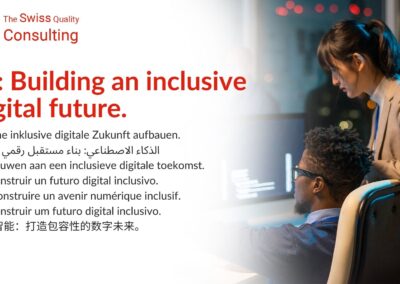Implementing Equity in Saudi Arabia and UAE
Understanding the Importance of Equity in Technology
Ensuring equity in technological benefits distribution is a critical goal for modern societies, particularly in rapidly advancing regions like Saudi Arabia and the UAE. As these nations invest heavily in Artificial Intelligence (AI), Blockchain, and the Metaverse, it is essential to ensure that the advantages of these technologies are accessible to all segments of the population. Equity in technology involves providing equal opportunities for access, utilization, and benefits, regardless of socioeconomic status, gender, or geographic location.
The significance of equity in technology cannot be overstated. Technological advancements have the potential to drive economic growth, improve quality of life, and solve complex social problems. However, without deliberate efforts to ensure equitable distribution, these benefits can exacerbate existing inequalities. In regions like Riyadh and Dubai, where technological innovation is a key component of national development strategies, promoting equity ensures that the benefits of growth are shared widely and inclusively.
Moreover, equitable distribution of technological benefits fosters social cohesion and stability. When all members of society have access to the tools and opportunities provided by modern technology, it reduces the risk of social fragmentation and conflict. This inclusive approach aligns with the broader vision of sustainable development, emphasizing the need to balance economic progress with social equity and environmental stewardship.
Strategies for Promoting Equity in Technological Distribution
To ensure equity in the distribution of technological benefits, several strategic approaches can be employed. One effective strategy is the implementation of inclusive policies and programs that specifically target underserved and marginalized communities. Governments and organizations in Saudi Arabia and the UAE can develop initiatives that provide access to digital infrastructure, education, and training for these groups, ensuring they can fully participate in the digital economy.
For instance, investing in digital literacy programs can equip individuals with the skills needed to leverage AI, Blockchain, and other advanced technologies. These programs can be tailored to various demographic groups, including women, youth, and rural populations, to ensure that everyone has the opportunity to benefit from technological advancements. By promoting digital literacy, these initiatives help bridge the digital divide and create a more inclusive technology landscape.
Another crucial strategy is the promotion of diverse and inclusive leadership within technology sectors. Ensuring that leadership teams and decision-makers reflect the diversity of the population can help ensure that technological developments consider the needs and perspectives of all societal groups. Executive coaching services can support this effort by developing leaders who are committed to equity and inclusion. These leaders can advocate for policies and practices that promote fair access to technology and its benefits.
Leveraging Modern Technology to Enhance Equity
Modern technology itself can be a powerful tool for promoting equity. AI and Generative AI, for instance, can be used to design and implement solutions that address specific challenges faced by underserved communities. AI-driven analytics can identify gaps in access and opportunities, allowing policymakers to tailor interventions more effectively. In Saudi Arabia and the UAE, leveraging AI for social good can help ensure that technological benefits are distributed more equitably.
Blockchain technology also offers significant potential for enhancing equity. Its transparent and decentralized nature can ensure that resources and opportunities are distributed fairly and without bias. For example, Blockchain can be used to create transparent systems for distributing financial aid, educational resources, and healthcare services. This transparency builds trust and ensures that benefits reach those who need them most, without being diverted or misused.
The Metaverse, a convergence of physical and digital realities, can also play a role in promoting equity. Virtual environments can provide access to education, healthcare, and employment opportunities that may be geographically or economically inaccessible. By creating inclusive and accessible virtual spaces, the Metaverse can help bridge gaps in access and provide new opportunities for engagement and development.
Ensuring Sustainable and Inclusive Technological Growth
Developing Equitable Technological Policies and Frameworks
Effective policy development is essential for ensuring equity in technological benefits distribution. Policymakers in Riyadh, Dubai, and other key regions must create frameworks that prioritize inclusivity and fairness in the deployment of new technologies. This involves not only addressing immediate access issues but also considering long-term impacts on equity and social cohesion.
Policies should include provisions for equitable access to digital infrastructure, such as broadband internet and smart devices. Ensuring that all regions, including rural and underserved areas, have access to these resources is fundamental. Additionally, policies should promote affordable access to technology, preventing cost barriers from excluding segments of the population from the benefits of digital transformation.
Furthermore, regulatory frameworks should be established to prevent discrimination and bias in the deployment of AI and other advanced technologies. This includes setting standards for algorithmic transparency and accountability, ensuring that AI systems are designed and implemented in ways that do not perpetuate existing inequalities. By embedding equity considerations into technological policies, governments can create a more inclusive and just digital future.
Fostering Collaboration and Partnerships for Equity
Collaboration between various stakeholders is crucial for promoting equity in technological benefits distribution. Governments, private sector companies, non-profit organizations, and educational institutions must work together to develop and implement inclusive strategies. In Saudi Arabia and the UAE, public-private partnerships can play a significant role in driving equitable technological growth.
For instance, technology companies can collaborate with educational institutions to develop curriculum and training programs that equip students with the skills needed for the digital economy. These programs can focus on underrepresented groups, ensuring that they have the opportunities to pursue careers in technology and related fields. Such partnerships can also involve joint research and development initiatives aimed at creating solutions that address specific equity challenges.
Moreover, engaging with communities and listening to their needs and perspectives is essential for developing effective and equitable technological solutions. Community involvement in the planning and implementation of technology projects ensures that interventions are contextually relevant and address the actual challenges faced by different societal groups. This participatory approach fosters trust and ensures that technological benefits are genuinely inclusive.
Conclusion: Building an Inclusive Digital Future
Ensuring equity in the distribution of technological benefits is essential for creating a just and inclusive digital future. In regions like Saudi Arabia and the UAE, where technological innovation is a key driver of development, strategic efforts are needed to ensure that all segments of society can benefit from advancements in AI, Blockchain, the Metaverse, and other modern technologies. By implementing inclusive policies, promoting diverse leadership, leveraging technology for social good, and fostering collaboration, these nations can create a technology landscape that is equitable and inclusive.
As technology continues to evolve, maintaining a focus on equity will be crucial for sustainable and inclusive growth. By prioritizing equity, businesses and governments can ensure that technological benefits contribute to broader societal well-being and economic prosperity. Ultimately, the goal is to harness the power of technology to create opportunities for all, fostering a future where everyone can thrive in the digital age.
#EquityInTechnology #TechnologicalBenefits #SaudiArabia #UAE #Riyadh #Dubai #ArtificialIntelligence #GenerativeAI #ExecutiveCoaching #Blockchain #Metaverse #BusinessSuccess #Leadership #ProjectManagement























